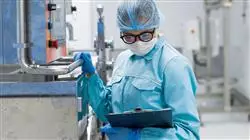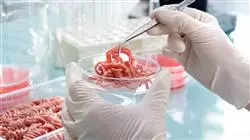University certificate
The world's largest faculty of veterinary medicine”
Introduction to the Program
Learn from real cases with this highly effective educational program and open new paths to your professional progress"

The Master's Degree in Veterinary Food Safety at TECH Global University is the most complete program compared to the master's degrees currently offered at other universities because it is aimed at the comprehensive management of food safety. Therefore, it covers all the necessary aspects demanded by professionals in the food sector in order to achieve a complete specialization.
The teachers of this program are university professors and professionals from various disciplines in primary production, the use of analytical and instrumental techniques for quality control, the prevention of accidental and intentional contamination and fraud, traceability, and regulatory certification schemes in Food Safety.
The Master's Degree in Veterinary Food Safety is based on a triple thematic structure: Quality, Food Safety and Research and Development (R&D&I). In other words, it contains a scientific-technical part, a quality and safety management part and a third part, focused on research and development of innovation projects. All this supported by the guarantee of food safety, quality assurance and sustainability in its production and the necessary food safety at a global level.
This program has been designed to respond to the demand of diverse professional profiles and professional disciplines such as basic sciences, experimental sciences and engineering, social sciences and the field of new technologies. In addition, it is focused on understanding and learning technical, management and project execution skills, as well as the development of competencies required by a competitive, innovative and modern food sector.
Students of the Master's Degree in Veterinary Food Safety will complete their specialization from a comprehensive perspective, both in product processes and, globally, in the certification of food safety in the food sector, starting from primary production and food processing, applicable legislation and regulations, and quality management to ensure food safety, to the integration in research projects, in the development of new products, their coordination and implementation.
It is an educational project committed to training high quality professionals. A program designed by professionals specializing in each specific subject who face new challenges every day.
You will be taught by experts in food legislation and quality and safety regulations, who will guide you through the entire learning process"
This Master's Degree in Veterinary Food Safety. contains the most complete and up-to-date program on the market. The most important features of the program include:
- The development of case studies presented by experts in Veterinary Food Safety
- The graphic, schematic, and eminently practical contents with which they are created, provide scientific and practical information on the disciplines that are essential for professional practice
- New developments in veterinary food safety
- Practical exercises where self-assessment can be used to improve learning
- Special emphasis on innovative methodologies in veterinary food safety
- Theoretical lessons, questions to the expert, debate forums on controversial topics, and individual reflection assignments
- Content that is accessible from any fixed or portable device with an Internet connection
If your objective is to broaden your skill set to include new paths of success and development, this is the Master's Degree for you: a specialization that aspires to excellence"
It includes, in its teaching staff, professionals belonging to the field of Veterinary Food Safety, who contribute to this program the experience of their work, in addition to recognized specialists from reference societies and prestigious universities.
The multimedia content, developed with the latest educational technology, will provide the professional with situated and contextual learning, i.e., a simulated environment that will provide immersive training programmed to learn in real situations.
This program is designed around Problem-Based Learning, where the specialist must try to solve the different professional practice situations that arise during the course. For this purpose, the professional will be assisted by an innovative interactive video system created by renowned and experienced experts in food safety with extensive experience.
This program will provide you with the personal and professional skills required to become an expert in Veterinary Food Safety"

Thanks to its online modality, you will be able to study wherever and whenever you want, being able to balance your personal and professional life"
Why study at TECH?
TECH is the world’s largest online university. With an impressive catalog of more than 14,000 university programs available in 11 languages, it is positioned as a leader in employability, with a 99% job placement rate. In addition, it relies on an enormous faculty of more than 6,000 professors of the highest international renown.

Study at the world's largest online university and guarantee your professional success. The future starts at TECH”
The world’s best online university according to FORBES
The prestigious Forbes magazine, specialized in business and finance, has highlighted TECH as “the world's best online university” This is what they have recently stated in an article in their digital edition in which they echo the success story of this institution, “thanks to the academic offer it provides, the selection of its teaching staff, and an innovative learning method aimed at educating the professionals of the future”
A revolutionary study method, a cutting-edge faculty and a practical focus: the key to TECH's success.
The most complete study plans on the university scene
TECH offers the most complete study plans on the university scene, with syllabuses that cover fundamental concepts and, at the same time, the main scientific advances in their specific scientific areas. In addition, these programs are continuously being updated to guarantee students the academic vanguard and the most in-demand professional skills. In this way, the university's qualifications provide its graduates with a significant advantage to propel their careers to success.
TECH offers the most comprehensive and intensive study plans on the current university scene.
A world-class teaching staff
TECH's teaching staff is made up of more than 6,000 professors with the highest international recognition. Professors, researchers and top executives of multinational companies, including Isaiah Covington, performance coach of the Boston Celtics; Magda Romanska, principal investigator at Harvard MetaLAB; Ignacio Wistumba, chairman of the department of translational molecular pathology at MD Anderson Cancer Center; and D.W. Pine, creative director of TIME magazine, among others.
Internationally renowned experts, specialized in different branches of Health, Technology, Communication and Business, form part of the TECH faculty.
A unique learning method
TECH is the first university to use Relearning in all its programs. It is the best online learning methodology, accredited with international teaching quality certifications, provided by prestigious educational agencies. In addition, this disruptive educational model is complemented with the “Case Method”, thereby setting up a unique online teaching strategy. Innovative teaching resources are also implemented, including detailed videos, infographics and interactive summaries.
TECH combines Relearning and the Case Method in all its university programs to guarantee excellent theoretical and practical learning, studying whenever and wherever you want.
The world's largest online university
TECH is the world’s largest online university. We are the largest educational institution, with the best and widest online educational catalog, one hundred percent online and covering the vast majority of areas of knowledge. We offer a large selection of our own degrees and accredited online undergraduate and postgraduate degrees. In total, more than 14,000 university degrees, in eleven different languages, make us the largest educational largest in the world.
TECH has the world's most extensive catalog of academic and official programs, available in more than 11 languages.
Google Premier Partner
The American technology giant has awarded TECH the Google Google Premier Partner badge. This award, which is only available to 3% of the world's companies, highlights the efficient, flexible and tailored experience that this university provides to students. The recognition as a Google Premier Partner not only accredits the maximum rigor, performance and investment in TECH's digital infrastructures, but also places this university as one of the world's leading technology companies.
Google has positioned TECH in the top 3% of the world's most important technology companies by awarding it its Google Premier Partner badge.
The official online university of the NBA
TECH is the official online university of the NBA. Thanks to our agreement with the biggest league in basketball, we offer our students exclusive university programs, as well as a wide variety of educational resources focused on the business of the league and other areas of the sports industry. Each program is made up of a uniquely designed syllabus and features exceptional guest hosts: professionals with a distinguished sports background who will offer their expertise on the most relevant topics.
TECH has been selected by the NBA, the world's top basketball league, as its official online university.
The top-rated university by its students
Students have positioned TECH as the world's top-rated university on the main review websites, with a highest rating of 4.9 out of 5, obtained from more than 1,000 reviews. These results consolidate TECH as the benchmark university institution at an international level, reflecting the excellence and positive impact of its educational model.” reflecting the excellence and positive impact of its educational model.”
TECH is the world’s top-rated university by its students.
Leaders in employability
TECH has managed to become the leading university in employability. 99% of its students obtain jobs in the academic field they have studied, within one year of completing any of the university's programs. A similar number achieve immediate career enhancement. All this thanks to a study methodology that bases its effectiveness on the acquisition of practical skills, which are absolutely necessary for professional development.
99% of TECH graduates find a job within a year of completing their studies.
Master's Degree in Veterinary Food Safety
Ensuring food safety is of paramount importance in the care of both human and animal health. Thanks to the continuous development of the food industry, it is increasingly possible to raise the quality standards required by the relevant authorities in each country. The faculty at TECH Global University has designed a master's program focused on both the traceability of raw materials and supplies, as well as food legislation concerning processes that ensure quality and safety. Through the program's content, professionals from various disciplines will stay informed about the latest trends in food product manufacturing, managed through R&D&I projects aimed at improving specific physiological functions and designing nutraceutical foods. Likewise, they will update their knowledge on the transformations that the quality management system has undergone due to digitalization.
Postgraduate Degree in Veterinary Food Safety
From primary production to distribution and sale, each phase of a product's creation must adopt good manufacturing practices to comply with established regulations. With this postgraduate program from TECH, professionals interested in this field will gain the necessary skills to control procedures in laboratories and food industries, using detection tools that prevent both accidental and intentional contamination. Additionally, they will refine their competencies in applying emerging analytical techniques to prevent food fraud. Upon completion of this master's program, graduates will be distinguished by their mastery of food safety certification schemes such as Food Safety and Food Integrity, as well as their expertise in designing digitization processes for Hazard Analysis and Critical Control Point (HACCP) programs. Moreover, they will be recognized for their interventions in the management and monitoring of prerequisite programs (PRPs) and standardized operational programs (SOPs).







